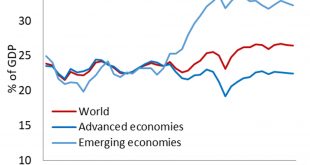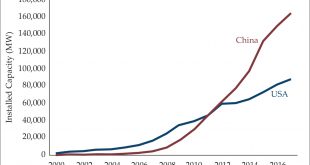Abstract: The new “secular stagnation hypothesis” developed by Lawrence H. Summers attempts to justify why the demand stimulus applied in the aftermath of the global financial crisis failed to revive growth in a satisfactory manner. Building on previous ideas of Keynes, Hansen, and Bernanke, Summers claims that excess savings together with feeble investment drove the natural rate of interest down to zero and advanced economies into stagnation. As the US monetary...
Read More »An Anatomy of Failure: China’s Wind Power Development
Abstract: China is currently the world’s largest installer of wind power. However, with twice the installed wind capacity compared to the United States in 2015, the Chinese produce less power. The question is: Why is this the case? This article shows that Chinese grid connectivity is low, Chinese firms have few international patents, and that export is low even though production capacity far exceeds domestic production needs. Using the tools of Austrian economics,...
Read More »Why the State Demands Control of Money
Imagine you are in command of the state, defined as an institution that possesses a territorial monopoly of ultimate decision making in every case of conflict, including conflicts involving the state and its agents itself, and, by implication, the right to tax, i.e., to unilaterally determine the price that your subjects must pay you to perform the task of ultimate decision making. To act under these constraints — or rather, lack of constraints — is what constitutes...
Read More »The Old Right on War and Peace
As the force of the New Deal reached its heights, both foreign and domestic, during World War II, a beleaguered and tiny libertarian opposition began to emerge and to formulate its total critique of prevailing trends in America. Unfortunately, the Left, almost totally committed to the cause of World War II as well as to extensions of the domestic New Deal, saw in the opposition not a principled and reasoned stand for liberty, but a mere blind "isolationism" at best,...
Read More »Savings Are the Foundation of Economic Growth
Most commentators’ regard savings as harmful to economic growth on the ground that savings are associated with fewer outlays. These commentators portray economic activity as a circular flow of money. Spending by one individual becomes part of the earnings of another individual, and spending by another individual becomes part of the first individual’s earnings. If for whatever reason people become less confident about the future, it is held that they are likely to cut...
Read More »“They Said What?!” John Lennon edition
Bob unveils a new recurring series, in which he gives the context of infamous quotations. In this episode, he covers two allegedly shocking quotes from John Lennon, John Maynard Keynes’ “in the long run we’re all dead,” Trump on Nazis being very fine people, Dan Quayle misspelling potato, Obama’s “you didn’t build that,” and Bohm-Bawerk on Karl Marx. Mentioned in the Episode and Other Links of Interest: Wikipedia entry on John Lennon’s “more popular than Jesus”...
Read More »What Made Rothbard Great
If you don’t mind, I am going to do what men of my age do from time to time, and that is tell you war stories—usually insufferably boring for younger people, but occasionally enlightening if you find that perhaps you are going through a similar trial. I want to talk about my own situation in 1961, ’62, ’63, when I was an undergraduate. It was a difficult time for those of us who were conservatives or libertarians, because we did not have lots of publications. We...
Read More »End the Shutdown, Again
Sixteen months ago, in March 2020, we argued for an end to government-imposed shutdowns of businesses, schools, churches, restaurants, and events due to the covid virus: The shutdown of the American economy by government decree should end. The lasting and far-reaching harms caused by this authoritarian precedent far outweigh those caused by the COVID-19 virus. The American people—individuals, families, businesses—must decide for themselves how and when to reopen...
Read More »How the Federalists Bullied Rhode Island into Joining the United States
Doughty, courageous little Rhode Island was the last state left. It is generally assumed that—even by the most staunchly Antifederalist historians—Rhode Island could not conceivably have gone it alone as a separate nation. But such views are the consequence of a mystique of political frontiers, in which it is assumed that a mere change in political frontiers and boundaries necessarily has a profound effect in the lives of the people or the validity of a territory or...
Read More »Modern Monetary Theory
Recorded at the Mises Institute in Auburn, Alabama, on 21 July 2021. [embedded content] You Might Also Like SNB Sight Deposits: Inflation Fear Decreasing, SNB Selling Euros 2021-08-04 Sight Deposits have fallen: The change is -0.2 bn. compared to last week, this means the SNB is selling euros and dollars. Government Land Ownership and Management 2021-08-03...
Read More » Swiss Economicblogs.org
Swiss Economicblogs.org








